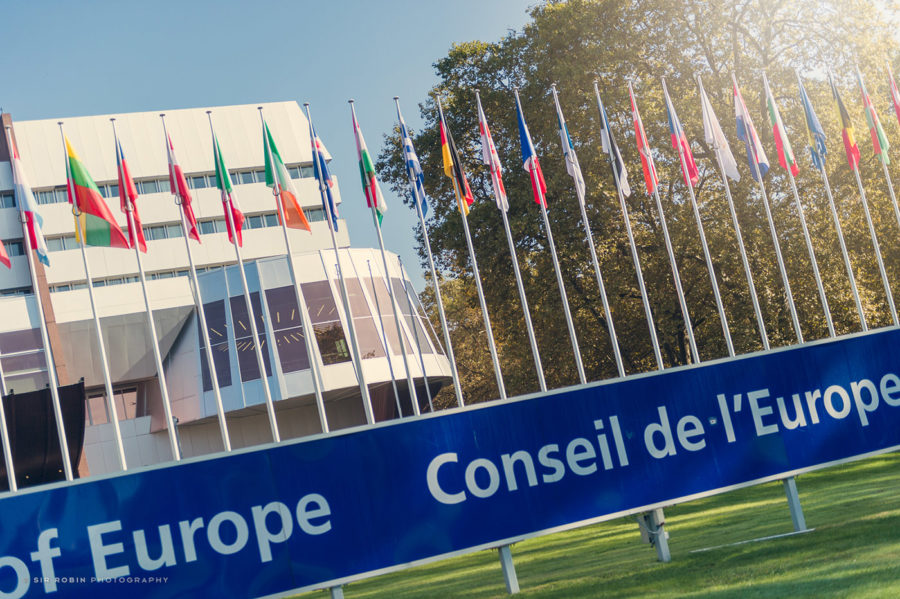Statement on the role of the Council of Europe in ensuring accountability for international crimes committed by Russia in Ukraine
The European civil society that participated in the CoE Civil Society Summit (CSS) in The Hague, Netherlands, on 28 February – 1 March 2023, has made a statement on the role of the Council of Europe in ensuring accountability for international crimes committed by Russia in Ukraine.

On February 20, 2014, the Russian Federation carried out an act of armed aggression, as a result of which it occupied part of the sovereign territory of Ukraine – the Crimean Peninsula. At the same time, in the east of Ukraine, Russia incited and supported the anti-government activities of illegal armed groups, which led to the declaration of “independence” of the so-called DPR and LPR on May 12, 2014. As a result of the armed aggression and temporary occupation of the territories of Ukraine, Russia committed war crimes and crimes against humanity, the scale and brutality of which reached their peak after the full-scale invasion on February 24, 2022.
Unimaginable acts of barbaric cruelty have been committed against the Ukrainian people in these 9 years. As of today, the Prosecutor General of Ukraine has registered over 71,500 international crimes committed by Russians in Ukraine.
The international community has to condemn this brutal aggression and criticize the policy of appeasement with a crucial role of territorial concessions, as well as crimes committed by Russia in other countries and territories. The CoE should encourage the efforts of State Members to recognize the Holodomor and deportation of Crimean Tatars as genocide against the Ukrainian nation. In this context, there is a need to tackle the historical manipulations and propaganda, to establish collaboration with the existing UN bodies regarding counteraction of the dissemination of prohibited types of information, to set the guidelines and principles of the monitoring of cyberspace and the use of ICT for commission of human rights violations during armed conflict, according to existing standards enshrined in the Tallinn manual, as well as to keep implementing sanctions against perpetrators, to create the position of the Special Rapporteur on sanctions and close the existing loopholes in the CoE Member States.
We would like to underline an urgent need to ensure a comprehensive system of accountability for grave breaches of international law committed by Russia as a part of the aggression against Ukraine to avoid impunity and to prevent further violations. The CoE has a crucial role in seeking justice, such as providing the necessary human and financial resources and administrative, investigative, coordinational, and logistical support to Ukraine in the long term.
Civil society, independent media, national and international mechanisms have actively stepped up with documentation and investigation of international crimes. The CoE could play a vital role in establishing a register to record and document evidence and claims of damage, loss, or injury due to Russian aggression against Ukraine in coordination and complementarity with existing mechanisms, especially the newly established Core International Crimes Evidence Database, and following the current international standards. Moreover, we encourage the CoE to promote transparency and accountability in the documentation of international crimes under the Berkeley and Istanbul Protocols, as well as assist in the coordination of efforts between various actors, and to promote the launch of the documentation process in the other countries where Ukrainian refugees reside. We underline the need for a victim-centered approach to accountability and compensation processes.
The number of war crimes committed on the territory of Ukraine on such a scale is a heavy burden for national prosecution systems, so international assistance is necessary to ensure a speedy and effective process that complies with international standards. We highly appreciate the CoE’s constant support. We also encourage the CoE to invite the expert bodies of the CoE to produce expert recommendations and guidelines relating to these issues within the ambit of their competence, in particular, regarding the introduction of amendments to the definition and detailed classification of war crimes in Ukrainian legislation, ratification of the Rome Statute, and elaboration of programs for victim’s support.
It is also crucial to guarantee the implementation of the principle of universal jurisdiction over international crimes committed by Russia in Ukraine by the CoE Member States, its standardization, as well as to provide technical assistance and advice. Moreover, there is a need to coordinate judicial and quasi-judicial mechanisms working on prosecution of perpetrators.
However, despite the unity of the international community and Ukraine in efforts to bring perpetrators to justice, a severe gap remains. The ICC has no jurisdiction over the crime of aggression, and there is a need to set up a Special International Tribunal on a complimentary basis to prosecute political and military leadership who “planned, prepared, initiated or executed” Russia’s war of aggression against Ukraine. Taking into account opportunities and weight of the organization, we call on the CoE to advocate for the most effective establishment of a Tribunal, to put words into action, and to show the whole world that Russia and Belarus are ruled not only by terrorists but also by war criminals. In addition, the CoE could assist in the selection and appointment of judges, elaborate rules of evidence and procedure, provide expert, technical, legal support and promote the involvement of the civil society, academic circles and survivors to its establishment.
The participants of the CoE CSS call to take into account the following suggestions as of activity of the CoE, its bodies and Member States:
● to condemn Russian aggression against Ukraine and crimes committed by Russia in other countries and territories, criticize the policy of appeasement and recognize the Holodomor and deportation of Crimean Tatars as genocide against the Ukrainian nation and indigenous people;
● to repress the commission by Russia of gross human rights violations and international crimes, in particular, from the side of CoE Member States by assisting Ukraine to repatriate persons deported and forcibly transferred by the Russian Federation, including children;
● to facilitate the implementation of the victim-centered approach to the accountability and compensation processes;
● to establish a register to record and document evidence and claims of damage, loss or injury in coordination and complementarity with existing mechanisms;
● to promote transparency and accountability in the documentation of international crimes, launch of the documentation process in the other countries and assist in the coordination of efforts between various actors;
● to invite the expert bodies of the CoE to produce recommendations and guidelines relating to accountability issues, promote the reforms of the Ukrainian national instruments and mechanisms;
● to guarantee the implementation of the principle of universal jurisdiction over international crimes committed by Russia in Ukraine by the CoE Member States, its standardization;
● to ensure the comprehensive coordination with the existing judicial and quasi-judicial mechanisms who are engaged in Ukraine’s issues;
● to promote implementation of the principle of universal jurisdiction among the Member States and perform its standardization;
● to advocate for the establishment of a Special Tribunal on the crime of aggression and to assist in its setting up, in particular, promoting involvement of civil society, academic circles and survivors to its establishment;
● to create the position of Special Rapporteur on sanctions imposed in connection with Russian aggression in order to close the existing loopholes in the CoE Member States;
● to tackle historical manipulations and propaganda and to establish collaboration with the existing UN bodies regarding the prevention and counteraction of the dissemination of prohibited types of information;
● to set the guidelines and principles of the monitoring of cyberspace and the use of ICT for commission of human rights violations during armed conflict.
If you have found a spelling error, please, notify us by selecting that text and pressing Ctrl+Enter.















